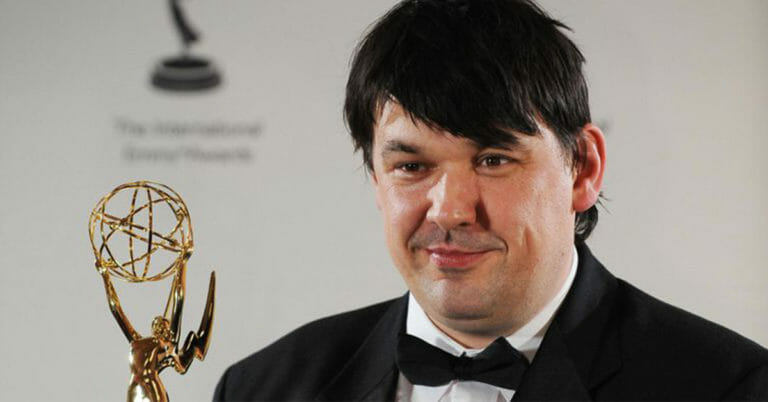By Martin Keady · November 15, 2018

Graham Linehan is one of the greatest TV comedy writers of the last thirty years, who has created or co-created (often with his regular writing partner, Arthur Mathews) some of the finest “Britcoms” of recent decades, including Father Ted, Black Books, The IT Crowd, Count Arthur Strong and the relatively little-known but still sublime The Walshes. The irony is, of course, that Linehan himself is not British but Irish, and thus can be seen as continuing the great tradition of Irish writing in the last 300 years, from Swift to Wilde to Joyce, whereby it is arguable that the greatest writers in English since Shakespeare have all been Irish. Linehan may not quite be a writer of that calibre, but as a TV comedy writer he is practically peerless.
Download the pilot script for THE WALSHES here for free.
First in Dublin for Ireland’s Hot Press magazine and then in London for the rather more famous NME. However, given that even in the so-called “golden age of music writing” (which lasted from roughly the 1970s through to the early 2000s) it was still almost impossible to survive by reviewing alone, Linehan always pursued a parallel career in comic writing, including co-writing with Arthur Mathews, a fellow journalist who he met while writing for Hot Press.
For shows as diverse as Alas Smith and Jones (starring Mel Smith and Griff Rhys Jones, who had achieved stardom on Not The Nine O’Clock News sketch show in the early 1980s) and The Day Today (the television adaptation of the radio comedy of the same name, whose other famous alumni include Chris Morris, Patrick Marber, Armando Iannuci and Steve Coogan).
Later, after the success of their first few comedy series, they returned to the sketch show format with the first series of Big Train (1998), which had such memorable sketches and characters as those engaged in an “international staring contest”. Nevertheless, it eventually dawned on Linehan and Mathews that their real comic genius lay not in sketch shows but in unusual, even bizarre, sitcoms.
The fact that this summer it was announced that there will soon be a musical based on Father Ted, fittingly called Pope Ted and to be written by Linehan and Mathews themselves, is the best testament to the show’s enduring popularity, more than 20 years after its last episode was screened. And the secret of that enduring popularity is not just the superb quality of the writing of the three series and 25 episodes (including Christmas specials), but the fact that Father Ted is one of those rare comedies, like Monty Python or The Young Ones, that captured and crystallised a historic moment before making it utterly hilarious.
The specific historic moment that Father Ted captured was the transition from what might be called the “old and traditional Ireland” that had existed for much of the 20th century to the “new and improved Ireland” of the late 20th and early 21st centuries. This “new and improved Ireland” was no longer condemned to repeat the mistakes of the past, particularly the reliance of the state and the people on the doctrine of the Catholic Church, but instead was determined to forge a wholly new identity for itself. And the fact that Ireland now has an openly gay leader, Leo Varadkar, is due, at least in part, to the genius of Father Ted.
It was a classic case of casting against the grain, whereby an actor whose own personal beliefs were completely at odds with those of the character he plays none the less imbued that character with extraordinary humanity and humour. Thus, just as it took a self-confessed fruitcake like Kelsey Grammer to play the (relatively) calm and lucid Doctor Frasier Crane, so the anti-church and anti-clerical Morgan ironically became the face of Irish Catholicism, not just for Ireland itself but around the world. Along with his dimwit sidekick, Father Dougal (played by Ardal O’Hanlon), and his other sidekick, the chairbound drunk Father Jack (played by Frank Kelly), Father Ted tried (and usually failed) to navigate the increasingly complex social and ethical mores of late 20th century Ireland, and was usually reduced to pointless gestures, such as holding up banners proclaiming, “Down With This Sort Of Thing”.
It was one in which Catholic priests like Ted and Dougal openly wondered “whether there’s a God at all” and entered the Eurovision Song Contest with a song called “My Little Pony”, while trying desperately not to win so that Ireland would not have to host yet another Eurovision, with all its enormous expense. At times radical (certainly in its depiction of a new and emerging Irish identity), at times purely Rabelaisian (especially in the tic or Tourettes-like cursing of Father Jack, who coined the family-friendly “f” word of “Feck!”), Father Ted was one of the truly great sitcoms, especially of the last 25 years.
Father Ted ended tragically, as Morgan was killed by a heart attack soon after filming the final series, prompting the type of “Ted’s Dead!” headlines that seemed to come straight from the imaginations of the writers themselves. The only upside of that tragedy, as it were, is that the show never got to grow old, let alone tired, and it remains as mint-fresh today as when it was first aired. And just as the tragic death of James Gandalfini made it impossible for any sub-par (or even sub-sublime) Sopranos episodes to be made, so the tragically early death of Dermot Morgan guaranteed that Father Ted would never fade into irrelevance or pitiful self-parody.
It is certainly true that none of their many subsequent comedy series have achieved the kind of seismic cultural impact that Father Ted did. Nevertheless, Just as Van Morrison may never have made another album quite as fabulous as Astral Weeks, and merely made a series of slightly inferior masterpieces such as Moondance, Tupelo Honey and It’s Too Late To Stop Now, so Linehan and Mathews have still written a succession of other successful and more importantly funny sitcoms.
Black Books was the co-creation of Linehan and its star, Dylan Moran, a superb Irish stand-up comic who, other than Black Books and the unfairly uncelebrated How Do You Want Me? (about a city-loving Irishman forced to relocate to the English countryside), has largely failed to translate his genius-level stage show into televisual material. Mathews also contributed to the three series (which ran between 2000 and 2004), and although Moran’s misanthropic bookshop owner, Bernard Black, was the polar opposite of the largely guileless and clueless Father Ted, the show was still extremely funny, especially when Moran’s sidekicks (played by the brilliant Bill Bailey and the equally brilliant Tamsin Greig) were on screen.
Set in the IT (supposedly an acronym for “information technology” but in reality short-hand for “idiot techies”) department of a big company, The IT Crowd really only ever had one good joke, but it was such a good one that it could be told and re-told apparently endlessly. The joke in question was that whenever a frustrated employee would phone up with a query about their computer, the members of the IT department would suggest various solutions to the problem before inevitably settling on, “Have you tried turning it on and off again?” Like the lines from Monty Python’s Dead Parrot sketch, “Have you tried turning it on and off again?” has long ago escaped its original setting and become a kind of universal plea for help that summarises the difficulty of all human beings in adapting to our increasingly digital age.
It’s based on the radio show of the same name and co-written with Steve Delaney, who also played the eponymous music-hall entertainer adrift in a post-modern (and to him post-humorous) world. If The IT Crowd only ever had one great joke, it is arguable that the three series of Strong only ever had one absolutely outstanding episode, but like The IT Crowd’s one joke it alone was enough to justify the whole series or succession of series. That episode was episode 2 of series 2, “The Day The Clocks Went Back”, a masterpiece of English uncommunicativeness in which Arthur and another man simultaneously think that the other man is the flying instructor and thus take off together for their first ever flying lesson sans trained pilot.
Given that it is co-written with, among others, another bona fide Irish comic genius in Sharon Horgan, it should be absolutely unbearably funny. Unfortunately, as I have written before, because of the lead casting of Anna Maxwell Martin (who is a dramatic actor of genius but rather less successful as a comedienne), Motherland occasionally appears to be almost a documentary or mockumentary rather than a sitcom that truly comes to life.
Before making Motherland, however, and deciding to write a Father Ted musical, Linehan wrote at least one other perfect sitcom, The Walshes, which may be the shortest great sitcom ever written. Consisting of only three half-hour episodes, The Walshes, which was co-created and co-written by Linehan and “Diet of Worms”, an Irish comedy collective, told the story of the eponymous Walsh family, a typical working-class Dublin family that Linehan has suggested was based at least in part on his own family.
The four Walshes themselves (dad Tony, mother Carmel, daughter Ciara and son Rory); Graham, Ciara’s boyfriend who (much to mother Carmel’s horror) moves in with the Walshes when he is evicted from his own flat; and neighbour Martin (who at one point gets stuck in a wall and tries to communicate his misfortune, only to be mistaken for the voice of God).
Like the best of Linehan’s work, particularly Father Ted, The Walshes is both thrillingly familiar and utterly, indescribably unique, combining both the broadest humour (it has to be admitted that some of the characters are perilously close to being caricatures) and the narrowest (such as wonderful, witty wordplay, including a whole episode that hinges on the correct or incorrect pronunciation of the word “benign”). For many Linehan fans, it is his finest work since Father Ted two decades earlier, and if it only ever amounts to three episodes (as it failed to garner a large audience, only those three were ever made), that is still enough to tell its so-ordinary-it’s-extraordinary story.
 Martin Keady is an award-winning scriptwriter whose work has been produced for film, television, stage and radio. His major credits include: The Final, a short film about the famous ending of the 1979 FA Cup Final, which was shown on Channel Four; Moon the Loon, a play about the legendary Who drummer, Keith Moon, which was premiered at The Edinburgh Festival; and a collection of love poetry, Shards, extracts from which have been broadcast on Radio Four.” http://theshakespeareplays.com/
Martin Keady is an award-winning scriptwriter whose work has been produced for film, television, stage and radio. His major credits include: The Final, a short film about the famous ending of the 1979 FA Cup Final, which was shown on Channel Four; Moon the Loon, a play about the legendary Who drummer, Keith Moon, which was premiered at The Edinburgh Festival; and a collection of love poetry, Shards, extracts from which have been broadcast on Radio Four.” http://theshakespeareplays.com/
For all the latest from The Script Lab, be sure to follow us on Twitter, Facebook, and Instagram.